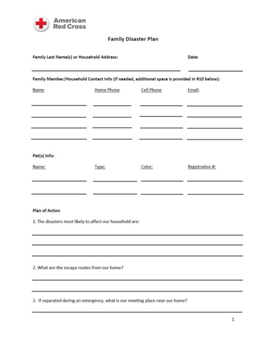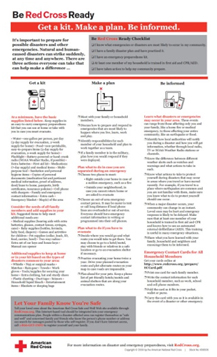Menu
Step 1: Start Your Plan
Visit the American Red Cross "Make a Plan" webpage.
 |
 |
| Family Disaster Plan (En Espanol) |
Step 2: Implement Your Plan
- Post emergency numbers by phones (ambulance, police, fire, etc.).
- Teach children how and when to call 9-1-1 for emergency help.
- Show each family member how and when to turn off the utilities (water, gas, and electricity).
- Check your insurance coverage.
- Get training from your local fire department for each family member on how to use the fire extinguisher (ABC type), and show them where it’s kept.
- Install smoke detectors on each level of your home, especially near bedrooms.
- Conduct a home hazard hunt. Make a Plan3.jpg
- Stock emergency supplies and assemble a disaster supply kit.
- Take first aid and CPR classes.
Step 3: Important Considerations
- Determine the best escape routes from your home. Find two ways out of each room.
- Find the safest places in your home for each type of disaster.
- Explain the dangers of fire, severe weather, earthquakes and other disasters to children. Plan to share responsibilities and work together as a team.
- Know the types of disasters that are most likely to happen in your community and know what to do in each case.
- Pick two places to meet: one right outside your home in case of a sudden emergency, like a fire, and one outside of your neighborhood in case you can’t return home. Make sure everyone knows the addresses and phone numbers of your meeting places.
- Ask an out-of-state friend or relative to be your “family contact.” After a disaster, it’s often easier to call long distance than local.
- Check on the emergency plans of all schools your children attend.
- Practice and maintain your family plan.
- Quiz your kids every six months.
- Conduct fire and emergency evacuation drills.
- Replace stored water and stored food every six months.
- Test and recharge your fire extinguisher(s) regularly.
- Test your smoke detectors monthly and change the batteries at least once a year.
For more information on developing your disaster plan, please visit http://www.ready.gov/make-a-plan and
http://www.redcross.org/prepare/location/home-family/plan




